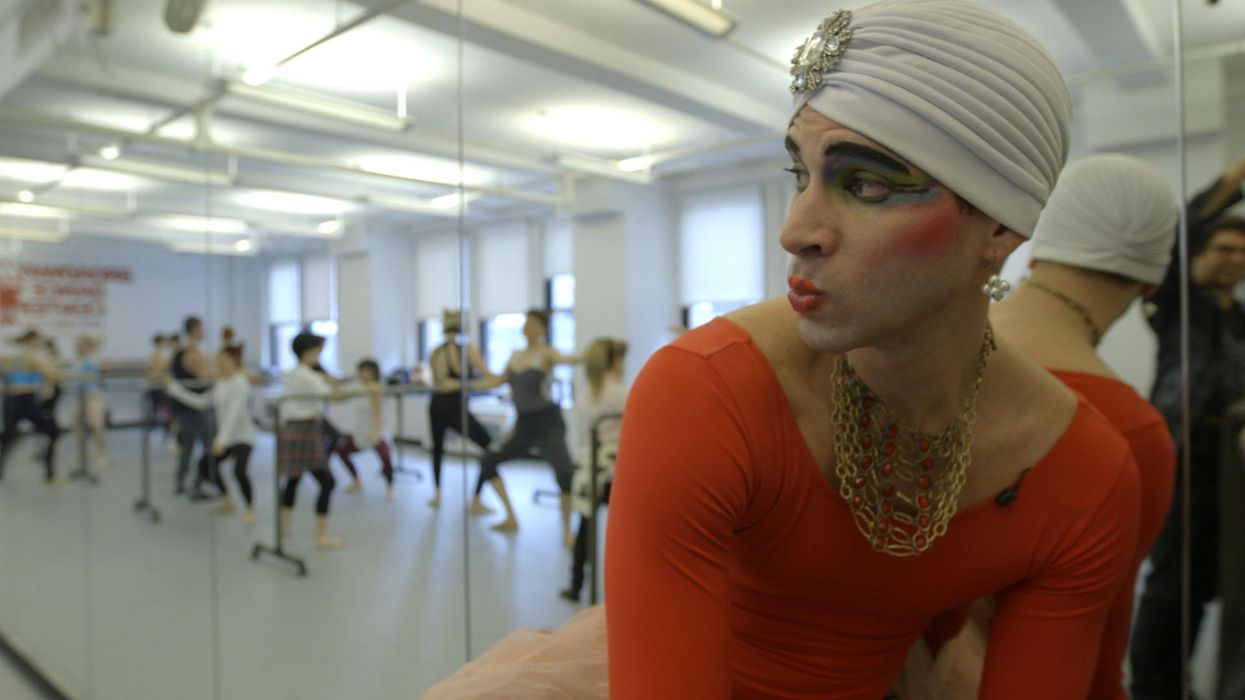
Michael "Mikey" Cusumano was a rising star at American Ballet Theatre in the 1990s, joining the company at 15 years old and dancing principal roles by age 16. But the high pressure of ballet proved detrimental to his emotional and mental well-being. "I couldn't find the joy in ballet anymore," says Cusumano.
After 10 years as a professional ballet dancer, Cusumano transitioned to Broadway, where his alter ego, a sparkly-turban–wearing Russian ballet instructor named Madame Olga, was able to fully emerge. In Madame Olga, Cusumano became the ballet teacher he wished he had growing up. While Olga's classes feature the same technical rigor as any other intermediate-advanced ballet class, they also incorporate her signature humor and positive affirmations. It's common for Madame Olga's students to vocalize those affirmations while dancing (for example, saying "love" out loud while doing an adagio combination).
Cusumano's journey to becoming Madame Olga is now captured in a new short documentary When I'm Her, directed by Emily Schuman and co-produced by Schuman, Independent Lens and ITVS. It premieres on PBS Voices June 21 as part of its LGBTQ+ Pride Month offerings. The film features home videos of Cusumano as a budding ballet prodigy and highlights a visit as Madame Olga to his old dance studio, Seiskaya Ballet. It also unearths issues that impact young ballet dancers, including fear and lack of self-confidence.
We chatted with Cusumano and Schuman to discuss the documentary and what has made Madame Olga resonate with ballet students both young and old.
What was the inspiration for capturing Madame Olga's story in a documentary?
Cusumano: A few years ago, Emily reached out to me and said she was curious what I was doing as Madame Olga and asked if she could film me. I said OK and we filmed a few times a year over the course of two years.
Schuman: I started dancing at age 3 at Seiskaya Ballet, which is the same school that launched Mikey's career. Mikey was a few years older than me, and I would often see him when he'd come back as a guest teacher or performer. I had my own trauma around ballet that I was working through as an adult. Following Madame Olga on social media, I started to notice how happy students were taking her classes, and that sparked my curiosity.

The film uncovers some pretty vulnerable moments you experienced throughout your career, Mikey. What was that like for you?
Cusumano: So many ballet dancers have this deep pain, whether they made it professionally as a dancer or not. It's like a self-hate. Being so young at ABT was a little bit traumatizing. I am so grateful for the experience, but I have seen a lot of dancers crumble under the pressure. It's very common, and I am glad that I was honest about that in the film and didn't sugarcoat anything.
Madame Olga talks a lot about self-love. What do you think ballet teachers can do to ensure they are taking care of the whole person, and not just developing strong technique?
Cusumano: Mental health isn't talked about very much in ballet. We are taught to look in the mirror and judge ourselves and think that everything could be better. Madame Olga makes you forget about those things and just be free. I needed to be free so badly when I was younger. I think teachers could start to incorporate that freedom in their classes. Whether I am teaching as Mikey or as Madame Olga, I always try to remind students to love themselves.
Schuman: What Madame Olga does is really embrace a dancer's flaws and turn them into something positive. I think that is a tool that can make someone a better dancer, and that was something I didn't experience with my teachers growing up.

What do you think needs to change in ballet training in order to create an art form that makes dancers want to stay in this field?
Cusumano: I remember being 11 and being told I was fat by a teacher and by the parents of other students because I had gained weight that year. I, as well as Madame Olga, am very much about teaching students to love every part of their body. When kids start taking ballet, they are taught right away what is not good about them—their feet aren't right, their legs are too short, etc. Teachers should start focusing more on the passion and human connection of this art form.
Madame Olga taught on Instagram Live throughout the pandemic and now has her own on-demand platform. Why do people keep coming back to her classes?
Cusumano: It's overwhelming the messages Madame Olga receives. A few years ago, this teenage girl sent a message saying "Taking your class was the first time I was able to look at myself and not hate myself. I felt completely free." She also gets a lot of messages from women in their 40s, 50s and 60s that say things like "You have no idea what your class has done for me. I have been able to heal this pain that I have been carrying because I hated my body." Every day is a new opportunity to create your own beautiful reality, and that's the energy Madame Olga focuses on.
from Pointe https://ift.tt/3j4nVib

ليست هناك تعليقات:
إرسال تعليق